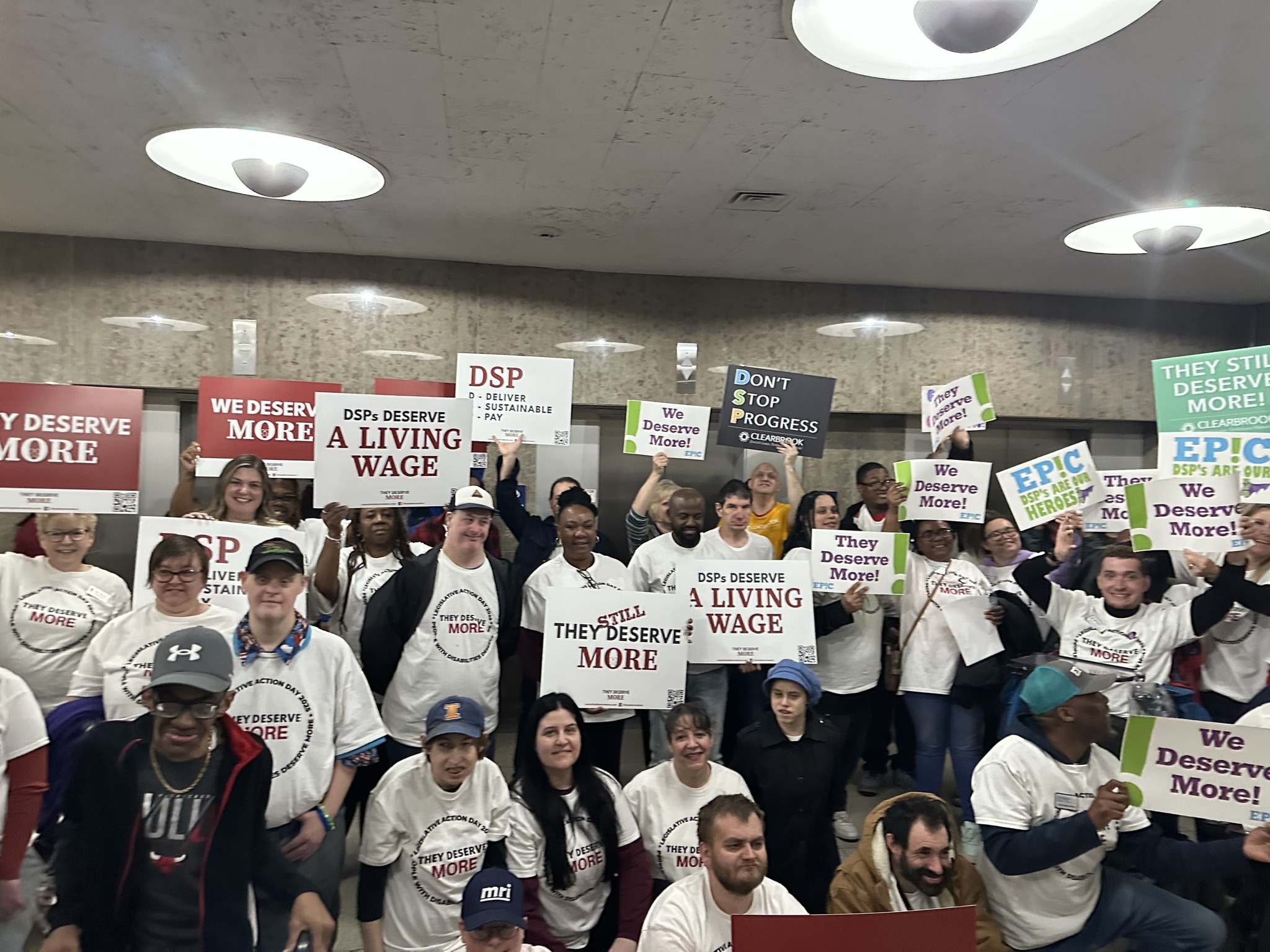Little City Participates in Advocacy Day in Springfield
Learn more about the They Deserve More-sponsored advocacy day Little City Foundation participated in to advocate on behalf of the IDD community.

“1, 2, 3, 4, They Deserve More!”
On April 9th, team members from Little City Foundation, supporters of the intellectual and developmental disability (IDD) community and IDD self-advocates went to Springfield, IL to fight for continued progress for wage equity and show their support for SB1690 and HB2788, which will help increase the minimum required wage for direct support professionals (DSPs) across Illinois.
This disability advocacy trip was organized by They Deserve More, a statewide coalition founded in 2017 that represents over 90 IDD community providers and associations, along with Illinois residents with IDD.
With an estimated 300,000 residents in Illinois with IDD, the stability of the IDD community system affects a large portion of the state’s population, not to mention their families, their providers and the communities they live in and contribute to. This is especially true for the 16,692 Illinois residents with IDD over 18 who are on the PUNS list (a statewide database of individuals with IDD who are planning for or seeking services) as of 3/31/2025.
The Issue
The Governor’s proposed budget for FY26 includes a $0.50/hour “increase” for DSP wages, which gets them to 137% of the statewide minimum wage. This sounds good on paper, but in 2020, it was actually higher at 140%. In addition, the administration simultaneously cut 886,420 DSP hours, which represents a minimum loss of 425 DSPs across the state. This equates to a loss of $32 million to the statewide community residential system.
The goal is to get to 150% of the minimum wage for DSPs across Illinois, which SB1690 and HB2788 would help achieve.
Why This Is a Problem
According to the most recent NCI-IDD “State of the Workforce” (published in 2024), 28% of providers in Illinois had to turn away or stop accepting new service referrals in 2023 due to DSP staffing issues. Taking hours out of an already fragile system will cause harm; nobody said there were too many hours or too many DSPs.
Limiting access to this care will have dire consequences. The people already served by organizations like Little City could suffer gaps in their services, which will have a direct impact on their quality of life, especially for those who need care 24/7. Many organizations will suffer financial loss to make up for the impending gap in funding because they need to keep their service levels the same with fewer hours funded by the state.
Also, there is already burnout among DSPs, and not paying them the wage they deserve will result in increases in care fatigue and an even more severe level of turnover. NCI-IDD reported that the turnover ratio for DSPs in Illinois was 46.8% in 2023, the fourth highest of the 26 states studied. The national average was 39.7%. Raising the minimum required wage for DSPs is critical to avoiding these issues.
“DSPs’ work is very difficult,” says Ann Morris, Chief of Communications at Little City Foundation. “We believe strongly that they should be compensated more than the minimum wage because of how hard it is and the amount of care and compassion they pour into their work. These people care deeply about the people we serve, and they deserve to feel valued and acknowledged because we would not exist without our DSPs.”
How We Advocated
In 2024, They Deserve More received a grant from The Coleman Foundation to expand their disability advocacy efforts. As part of that, they invited some of the providers and associations they support to join them on the road to advocate, including this most recent trip to Springfield that eight members of Little City’s team participated in.
During this visit, over 230 people demonstrated in the Capitol, and many held meetings with their local legislators to talk about the importance of DSP wages in supporting the IDD community and how SB1690 and HB2788 would help.
“While we were there, someone from the press office told us we were the largest advocacy group they had seen all year, and maybe in some time,” says Laura Anderson, Lead Strategist and Legislative Liaison for They Deserve More. “Organizations on their own can impact their local legislators, mayors or county boards, and that’s important, but when you’re talking about the stability of an entire system, you’ve got to go big or go home. This was our way of doing that.”
At one point during the day, somebody in the group began a chant, during which everybody yelled “1, 2, 3, 4, They Deserve More!” in the Capitol Building’s rotunda for nearly 20 minutes.
“We already knew the state budget was going to be really tight going into this year, and we could have been resigned to the fact we weren’t going to see movement on this issue,” says Morris. “Now, we remain hopeful that our voices will be heard.”


